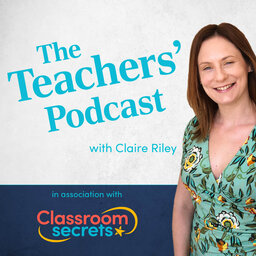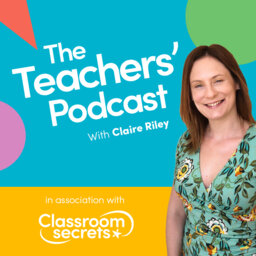Alison Philipson (AP Literacy): Reading, writing and spelling in schools
In this episode, Claire meets with Alison Philipson, an independent literacy consultant who works predominantly in Yorkshire and the North West of England.
Alison discusses how she supports schools and teachers with their English teaching focusing on strategies to develop reading and writing - in particular, how schools can help children to improve with their spelling.
Claire talks with Alison about how she moved from working in a wide variety of different jobs - such as telephone sales, finance and advertising – to enjoying a volunteer role in her local school which ignited her interest in teaching. Alison discusses how becoming a Leading Literacy teacher led to her working for the Local Education Authority’s English department supporting schools and then, ultimately, leaving to create her own consultancy company.
Alison also reflects on aspects of other educational roles she has held such as being a moderator and assessment lead for the Local Authority. She shares her thoughts on these roles and gives some tips for schools and teachers based on her experiences.
KEY TAKEAWAYS
- Modelled, Shared and Guided writing.
Modelling writing while children observe can be incredibly useful. Plumbers or electricians new to their jobs would initially learn by seeing more experienced people, and this is the same for children and writing. It is also useful as a way to model the best use of resources in the classroom such as Working Walls. However, it is also one of the more difficult aspects of teaching because teachers have to be good writers. This can be more difficult if it is not your passion. - Guided writing has fallen out of the spotlight
Guided writing was quite a big aspect of teaching writing in the 2000's but seems to have taken a bit of a ‘back seat’ since. However, it can be very useful as it allows teachers to spend time focusing in more detail with groups or individuals about how to improve their work. - Children can’t learn to spell if they don’t practise.
Spelling is a particular concern in a significant number of schools. But how often do children practise and apply their spelling knowledge? A ‘real world’ parallel would be putting up a tent: watching someone put a tent up a few times probably won’t help someone learn how to do it well. However, having a go putting a tent up, and then practising doing it regularly afterward will help the knowledge stick. It is the same with children’s spelling. Ten to fifteen minutes a day focusing on spelling is needed to allow knowledge to be regularly taught, applied and embedded. - For key assessments, don’t be hesitant to use the strategies you can.
For assessed and moderated pieces of work, while children can’t ask the teacher for help, there are things they can do. Seeking support from each other, passing books around to share ideas and using spelling banks are all examples of pupils being independent learners which are permitted. - Spelling has a big impact on assessments.
Children can have the most fantastic and creative ideas, and can be great writers, but their assessments will not reflect this if they are poor at spelling. Schools starting a regular focus on spelling lower down in school can really help to make a difference by the end of the key stages. - The number one area for CPD in writing should be supporting teachers to develop themselves as writers.
It is really hard to be a good writer while modelling ‘on the spot’ for children. Teachers are generally natural readers, but very few teachers write for pleasure and can find it difficult. - Writing alongside children in lessons can be powerful.
Having a go at writing what you expect the children to write alongside them can be really useful to compare and look at the positives in all pieces and enable children to see how you have approached different aspects of the work. - Giving the children time to practise is important.
The new curriculum has been good for promoting a focus on the consolidation of learning. With the significant number of things teachers need to fit into a term, it can be easy to end up cramming lessons in and squeezing out the time children could use to just ‘have a go’ at putting into practice what they have learned. Children do need time to broaden their understanding of what they cover and embed their learning. - The curriculum now is much less subjective than it was before.
The statements in the curriculum are what makes a child age-related. It is not best-fit as it once was. A key problem which teachers voice is how best to judge writing for Years 1, 3, 4 and 5, which can be tricky as the main focus of assessments is aimed at Years 2 and 6. A good knowledge of the statements for their year-group is what teachers need, and there are resources (see https://apliteracy.com/) available to help with this.
BEST MOMENTS
“I don’t ever consider myself as having left teaching because that’s why I’m here today: because of my love and passion for it.”
“It is awful having to say to a teacher, ‘Yes, they’ve got great ideas, the punctuation is there, the grammar – fantastic – but the spelling’s not there.”
“Teachers get reading more because most teachers are readers – we read for pleasure, so we get it. Whereas we write lists, we plan, we might write WAGOLLS, but we don’t write for pleasure. We don’t practise. We don’t do it day in day out.”
“I often ask on my courses ‘who writes for pleasure’? Very, very, very few people put their hands up.”
“It’s all about the pace of learning, not the pace of teaching.”
“I would never say, ‘Throw all that out and just do it my way.’ Keep what works and adapt it to work even better.”
“I have really missed working with children… but I do love what I’m doing. I try to think of the all the teachers I work with, all of their children as my children.”
“I do fervently believe that [the work/life balance] comes from within a school: the philosophy and the trust of the leadership team with the teachers.”
“I go into schools where [staff well-being] really is a top priority and that’s absolutely brilliant, especially for new teachers who haven’t got the experience to know what’s important and prioritise.”
“If you feel valued, and that you are important, you are going to learn and get to where you need to be.”
VALUABLE RESOURCES
Alison Philipson - AP Literacy: https://apliteracy.com/
Assessment resources: https://apliteracy.com/resources-2/writing/
The Teachers’ Podcast: https://www.facebook.com/groups/TheTeachersPodcast/
Classroom Secrets Facebook: https://www.facebook.com/ClassroomSecretsLimited/
Classroom Secrets website: https://classroomsecrets.co.uk/
LIFE/work balance campaign: https://classroomsecrets.co.uk/lifeworkbalance-and-wellbeing-in-education-campaign-2019/
ABOUT THE HOST
Claire Riley
Claire, alongside her husband Ed, is one of the directors of Classroom Secrets, a company she founded in 2013 and which provides outstanding differentiated resources for teachers, schools, parents and tutors worldwide.
Having worked for a number of years as a teacher in both Primary and Secondary education, and experiencing first-hand the difficulties teachers were facing finding appropriate high-quality resources for their lessons, Claire created Classroom Secrets with the aim of helping reduce the workload for all school staff.
Claire is a passionate believer in a LIFE/work balance for those who work in education citing the high percentage of teachers who leave or plan to leave their jobs each year. Since February 2019, Classroom Secrets has been running their LIFE/work balance campaign to highlight this concerning trend.
The Teachers’ Podcast is a series of interviews where Claire meets with a wide range of guests involved in the field of education. These podcasts provide exciting discussions and different perspectives and thoughts on a variety of themes which are both engaging and informative for anyone involved in education.
In 1 playlist(s)
The Teachers' Podcast
The Teachers' Podcast provides additional support to teachers. Whether it's ideas to be used in the …Social links
Follow podcast
Recent clips

Mental Health and Children’s Activities: Jane James, founder of Little Voices
19:19

Bringing Coaching Tools into the Classroom: Alice Westbury, education coach
25:44

How to say ‘no’ without the guilt: Annabel Jeffcoate, coach and founder of Balance for Teachers
38:02
 The Teachers' Podcast
The Teachers' Podcast